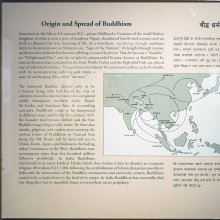Rajakumara, Rājakumāra, Rajan-kumara, Rājākumāra, Raja-kumara: 13 definitions
Introduction:
Rajakumara means something in Hinduism, Sanskrit, Buddhism, Pali, the history of ancient India, Marathi. If you want to know the exact meaning, history, etymology or English translation of this term then check out the descriptions on this page. Add your comment or reference to a book if you want to contribute to this summary article.
Images (photo gallery)
In Hinduism
Purana and Itihasa (epic history)
Source: archive.org: Shiva Purana - English TranslationRājakumāra (राजकुमार) or Rājakumāraka refers to a “prince”, according to the Śivapurāṇa 2.5.5 (“The Tripuras are fascinated).—Accordingly, as Sanatkumāra narrated to Vyāsa: “O sage, addressing the lord of the Asuras and the citizens thus, the sage with his disciples spoiled the Vedic rites in a determined manner. [...] The fascinated men practised rites of seduction and winning over and made their artifices fruitful in gaining other men’s wives. The attendant maids in the harems, the princes (rājakumāraka), the citizens and the ladies were perfectly enchanted by him. Thus when the citizens became averse to virtuous rites and actions, evil reigned supreme. [...]”.

The Purana (पुराण, purāṇas) refers to Sanskrit literature preserving ancient India’s vast cultural history, including historical legends, religious ceremonies, various arts and sciences. The eighteen mahapuranas total over 400,000 shlokas (metrical couplets) and date to at least several centuries BCE.
India history and geography
Source: Cologne Digital Sanskrit Dictionaries: Indian Epigraphical GlossaryRājakumāra.—(IE 8-3; LL; HD), same as Rājaputra; desig- nation of a prince. Cf. Ep. Ind., Vol. I, p. 5. Note: rājakumāra is defined in the “Indian epigraphical glossary” as it can be found on ancient inscriptions commonly written in Sanskrit, Prakrit or Dravidian languages.

The history of India traces the identification of countries, villages, towns and other regions of India, as well as mythology, zoology, royal dynasties, rulers, tribes, local festivities and traditions and regional languages. Ancient India enjoyed religious freedom and encourages the path of Dharma, a concept common to Buddhism, Hinduism, and Jainism.
Languages of India and abroad
Pali-English dictionary
Source: BuddhaSasana: Concise Pali-English Dictionaryrājakumāra : (m.) a prince.
Source: Sutta: The Pali Text Society's Pali-English DictionaryRājākumāra refers to: a (royal) prince (cp. khattiya-kumāra) Vin. I, 269; J. III, 122; VbhA. 196 (in comparison).
Note: rājākumāra is a Pali compound consisting of the words rājā and kumāra.

Pali is the language of the Tipiṭaka, which is the sacred canon of Theravāda Buddhism and contains much of the Buddha’s speech. Closeley related to Sanskrit, both languages are used interchangeably between religions.
Marathi-English dictionary
Source: DDSA: The Molesworth Marathi and English Dictionaryrājakumāra (राजकुमार).—m (S) pop. rājakumara & rājakuṃvara m A son of a king, a prince. 2 rājakuṃvara is further a term for the nakṣatra punarvasu.
Source: DDSA: The Aryabhusan school dictionary, Marathi-Englishrājakumāra (राजकुमार) [-kumara-kuṃvara, -कुमर-कुंवर].—m A prince.
Marathi is an Indo-European language having over 70 million native speakers people in (predominantly) Maharashtra India. Marathi, like many other Indo-Aryan languages, evolved from early forms of Prakrit, which itself is a subset of Sanskrit, one of the most ancient languages of the world.
Sanskrit dictionary
Source: DDSA: The practical Sanskrit-English dictionaryRājakumāra (राजकुमार).—a prince.
Derivable forms: rājakumāraḥ (राजकुमारः).
Rājakumāra is a Sanskrit compound consisting of the terms rājan and kumāra (कुमार).
Source: Cologne Digital Sanskrit Dictionaries: Benfey Sanskrit-English DictionaryRājakumāra (राजकुमार).—m. a prince, [Lassen, Anthologia Sanskritica.] 7, 2. Sanatkº, i. e.
Rājakumāra is a Sanskrit compound consisting of the terms rājan and kumāra (कुमार).
Source: Cologne Digital Sanskrit Dictionaries: Cappeller Sanskrit-English DictionaryRājakumāra (राजकुमार).—[masculine] rikā [feminine] a king’s son & daughter.
Source: Cologne Digital Sanskrit Dictionaries: Monier-Williams Sanskrit-English DictionaryRājakumāra (राजकुमार):—[=rāja-kumāra] [from rāja > rāj] m. a king’s son, prince, [Vetāla-pañcaviṃśatikā; Sāhitya-darpaṇa]
[Sanskrit to German]
Sanskrit, also spelled संस्कृतम् (saṃskṛtam), is an ancient language of India commonly seen as the grandmother of the Indo-European language family (even English!). Closely allied with Prakrit and Pali, Sanskrit is more exhaustive in both grammar and terms and has the most extensive collection of literature in the world, greatly surpassing its sister-languages Greek and Latin.
Kannada-English dictionary
Source: Alar: Kannada-English corpusRājakumāra (ರಾಜಕುಮಾರ):—[noun] a son of a king; a nonreigning male member of a royal family; a prince.
Kannada is a Dravidian language (as opposed to the Indo-European language family) mainly spoken in the southwestern region of India.
See also (Relevant definitions)
Partial matches: Kumara, Rajan, Raja.
Starts with: Rajakumaraka, Rajakumaratmaja.
Ends with: Adhirajakumara, Balaka-maharajakumara, Girirajakumara, Maharajakumara.
Full-text: Rajakuvara, Rajaguvara, Rajakumaraka, Rajadaraka, Rajakumarika, Girirajakumara, Rajaputra, Kumara, Kaumararajya, Sarvasiddhanta, Abhaya, Samprabhanita, Palita, Simha, Jivaka, Kuru.
Relevant text
Search found 4 books and stories containing Rajakumara, Raja-kumara, Rājā-kumāra, Rāja-kumāra, Rājakumāra, Rājākumāra, Rajan-kumara, Rājan-kumāra; (plurals include: Rajakumaras, kumaras, kumāras, Rājakumāras, Rājākumāras). You can also click to the full overview containing English textual excerpts. Below are direct links for the most relevant articles:
Bihar and Eastern Uttar Pradesh (early history) (by Prakash Narayan)
Monks and Kings < [Chapter 4 - Social Process, Structures and Reformations]
The Buddha and the Jains < [Chapter 4 - Social Process, Structures and Reformations]
State formation < [Chapter 1 - Political Formation at the time of Buddha]
The Great Chronicle of Buddhas (by Ven. Mingun Sayadaw)
Buddha attributes (4): Sugato < [Chapter 42 - The Dhamma Ratanā]
Part 2 - The Story of Prince Bodhi < [Chapter 26 - The Buddha’s Eighth Vassa at the Town of Susumaragira]
Abhaya Rājakumāra Sutta in Brief < [Chapter 42 - The Dhamma Ratanā]
Maha Prajnaparamita Sastra (by Gelongma Karma Migme Chödrön)
Story of Bimbisāra at Āmrapāli’s home < [Part 2 - Means of acquiring meditation]
